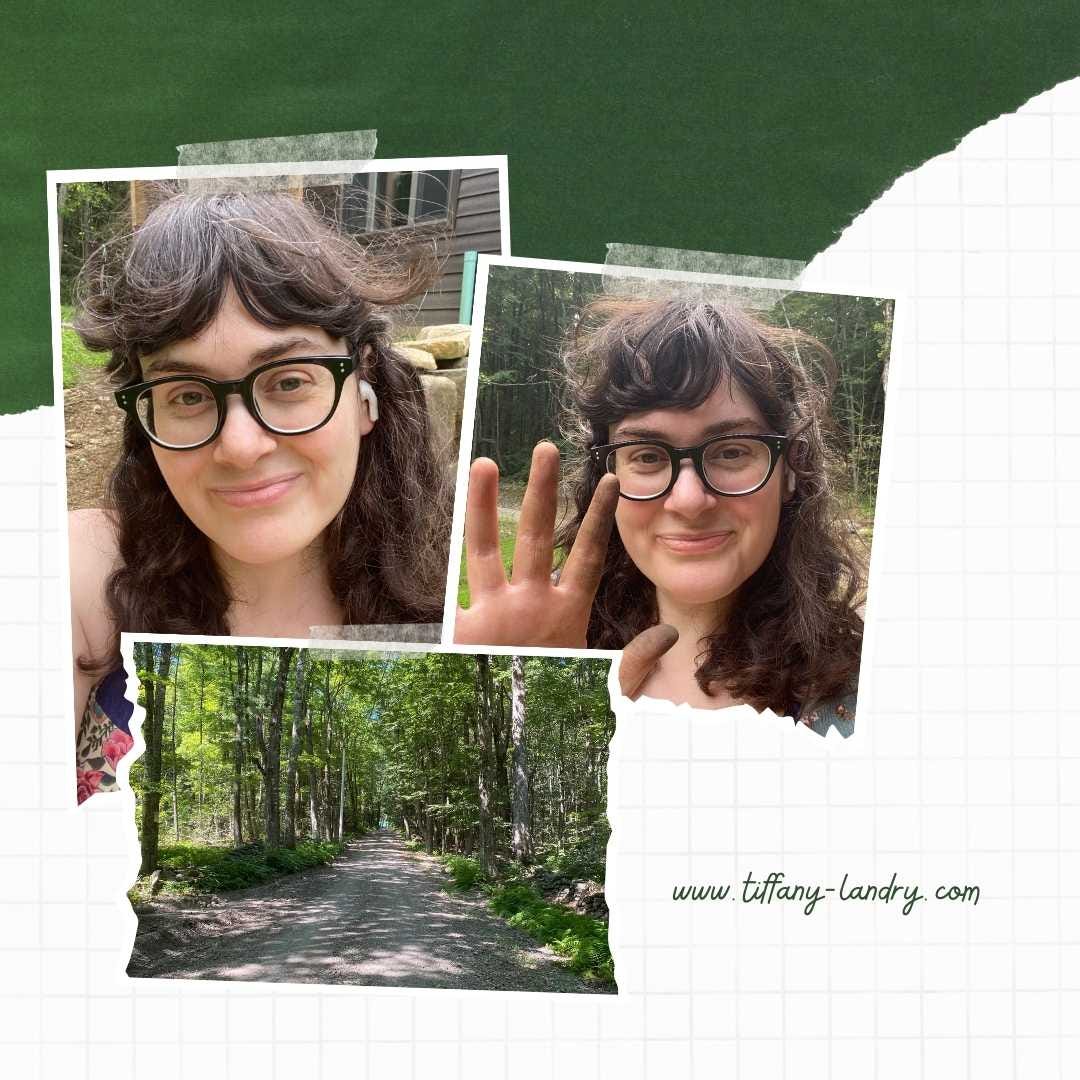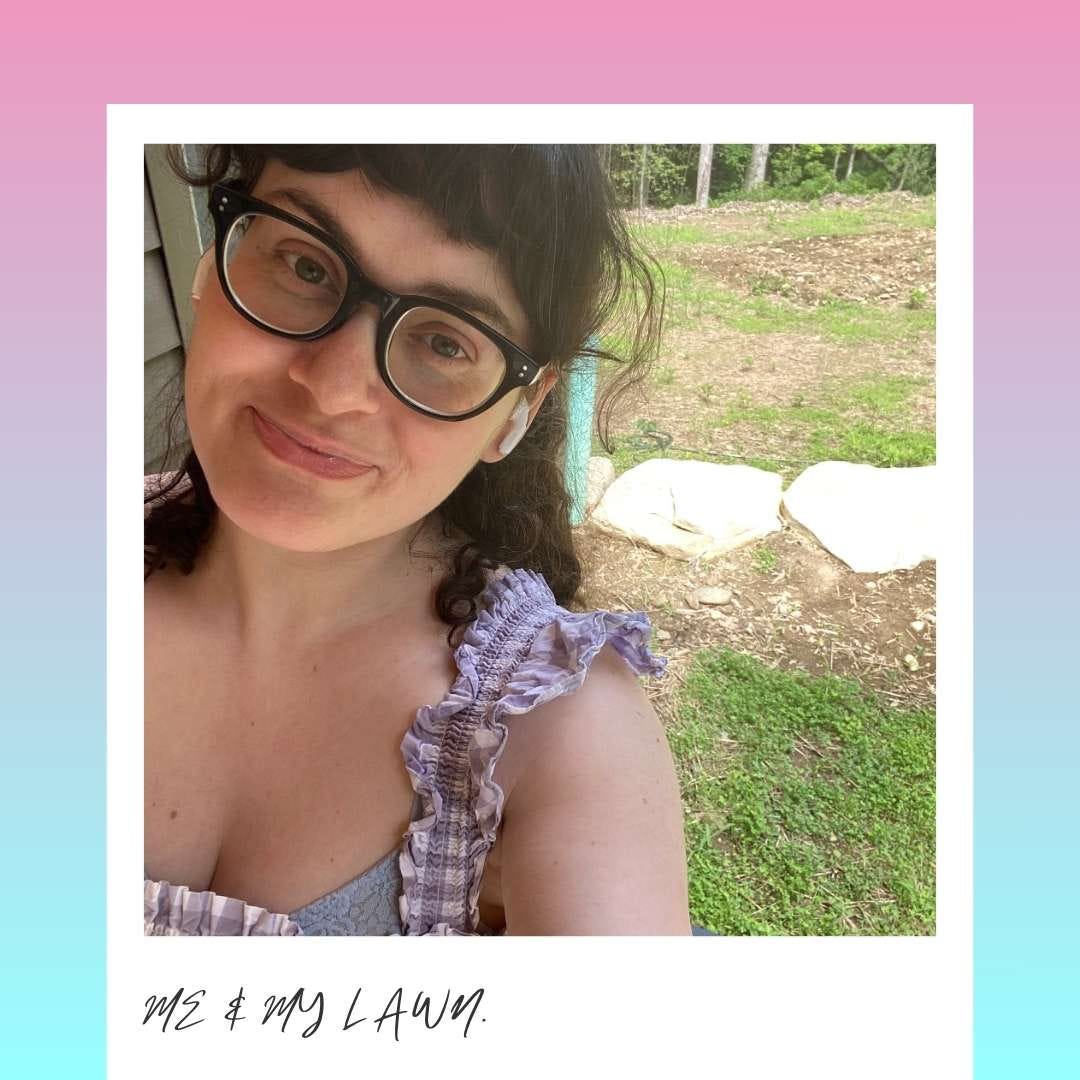This past Wednesday I’m walking down the street of the busy city where I used to live and now visit to do errands. It’s hot, noisy and crowded thanks to the hellish Sidewalk Sales that are going on. So I’m walking with my AirPods in, music blasting and flapping my hands. It’s just what my body wants to do so I do it-and I don’t particularly care if people stare at me. I mean what’s more beautiful than someone stimming? But there was a time when I very much did care. I can remember the first time I flapped my hands in public and how scary it felt. Or how self conscious it made me when people would stare at me wearing my noise cancelling headphones. When I was newly diagnosed it felt scary to take the teeniest tiniest steps in being my authentic Autistic self.
It’s been almost three years since I received my autism diagnosis (and longer since I started self-identifying as Autistic) and there’s a comfort to myself that simply wasn’t there before. The truth is that when I first heard the concept of unmasking I was like “YES!” The double whammy of coming out later in life and then realizing that I’m an AuDHDer made me want to make up for lost time. I had spent so long hiding my feelings, invalidating my experiences and feeling shame for being “bad” and “strange.” So I leapt head first into learning about what masking was and how to begin to unmask. But unmasking is a lot more nuanced than how people (myself included!) talk about it on social media. Masking and unmasking is complex, nuanced and needs to include things like: privilege, the impact of stigma and safety.
So what is a more nuanced definition of masking? I really appreciate how Dr. Megan Neff of Neurodivergent Insights defines masking as “the conscious or unconscious act of suppressing or camouflaging Autistic traits and behaviors as a safety response or due to a need to socially blend in with neurotypical norms.”1 In Dr. Neff’s Autistic Unmasking workbook she unpacks how early research on Autistic camouflaging focused on masking being an adaptive strategy to fit in socially but how more recent research views masking as a survival strategy. Dr. Neff shared in their workbook how in the book Autistic Masking: Understanding Identity Management and the Role of Stigma authors Pearson and Rose view masking as an instinctual urge for safety, that comes from a need to evade harmful interactions and traumatic experiences. So masking can be a conscious or unconscious way we protect ourselves from danger, stigma, being excluded or marginalized.2
So if masking is a safety response then a key part of our unmasking journey is going to focus on creating safety. I believe that we can do that by:
Exploring a more nuanced approach to masking and unmasking. That could look like acknowledging that masking and unmasking is complex and isn’t about just choosing to “take off the mask.” It might feel supportive to take away the pressure to unmask or even to read about the benefits/cons of masking and unmasking.
Unpacking internalized ableism and stories/messages you’ve heard and/or internalized that are rooted in shame and stigma. A helpful part of my own unmasking journey was unpacking my internalized ableist beliefs and rewriting them from an autistic affirming lens.
Creating conditions of safety. This could look like making environments more sensory safe, connecting to Autistic culture, exploring how you can advocate for your needs, healing Autistic Trauma with a neurodivergent affirming therapist or coach.
Exploring unmasking for yourself first. Before unmasking in front of others you might get to know your authentic self by yourself. You could do that by tending to your sensory needs in your home, exploring things that give you pleasure, joy and delight.
Bring awareness to the moment when you’re being your authentic self. How does it feel to connect to your authentic self? What’s there to notice in terms of emotions, body sensations or cues?
When I look back at my own unmasking journey the thing that I’m most proud of is how I learned to love and embrace my authentic self. I truly love how my brain works and when I notice an internalized message pop up I approach it with kindness and curiosity. I’ve become very skilled at both identifying my needs and advocating for them, as well as validating that my needs make so much sense. I also want to name that I 100% didn’t do it alone. I’ve worked with Autistic affirming practitioners, I’ve received so much support and care from the Autistic community and my close Autistic and AuDHDer friends. I also want to name that I still sometimes mask! I feel like it’s important to name the both/and of that getting to know my authentic self has been really beautiful and there are still situations and environments3 where I mask-and that’s totally okay.
There’s so much more to say about masking and unmasking but this feels like a good start. Please feel free to share your own experiences with masking/unmasking or to ask any questions in the comments!
Musings, Shares & Biz Things 💗

I’m celebrating that I applied to an advanced somatic trauma resolution training and was accepted! I’ll start this training in November and I’m excited to go deeper in my trauma resolution skills and education.
I’ve been weeding a lot lately and it’s actually a lot of fun! There’s something so satisfying about ripping up weeds, feeling the breeze on my face and watching small little frogs jump out of the way.
I’m feeling so much gratitude for my sweet house and land. There’s a slowness and awe that feels so nourishing and soothing. Sometimes it’s having my morning smoothie out on my favorite boulder in front of my house, other times it’s staring with awe at the pouring rain or feeling the delicious breeze on my face.
I made a little series on TikTok of dating when you’re Autistic to promote my 55 page workbook The Autistic Dating Guide. You can learn more and buy a copy here. I’m really proud of this guide and it’s kind of interesting to be promoting it when I’m taking an extended break from dating (which I am personally loving.) I also gifted it to two of my autistic friends and it’s been fun to share!
I’m doing some Feeler Calls for my program The Autistic Mentorship and I’d love to chat if you’re interested in autistic and somatic private coaching. The Autistic Mentorship includes 3 sessions a month, 2 bonus check in calls, session recaps and practices sent via email and neurodivergent workbooks as needed. Please feel free to read more about this program here and to reach out via email/contact form on my website to chat about if this program would be a good fit for you. Have a question about payment plans or want a shorter program? Please feel free to reach out!
Thank you for being here, I appreciate you.
I realized yesterday that Substack is the only place on the internet (apart from my blog and personal Facebook) where I allow comments. I think it’s because for me Substack feels cozy, intimate and slow. So please feel free to share any reflections, shares or questions in the comments. I will respond! If you share, repost or like this newsletter-thank you! That brings a smile to my face and helps support my work.
I am wishing you a restful and supportive Sunday! I hope you eat something delicious and get to do something that gives you joy.
Warmly,
“Autistic Masking” Workbook by Dr. Megan Anna Neff of Neurodivergent Insights, page 03-the emphasis is mine. You can purchase a copy here. I learned a lot of the content that I shared on masking/unmasking in this newsletter from Dr. Neff. I highly suggest checking out her content on masking/unmasking.
Any conversation about masking needs to talk about privilege. For example: there are autistic individuals who can’t mask, as well as Autistics and AuDHDers who might need to mask due to safety issues. Trans Autistic people might mask as a way to navigate a transphobic society. There’s also the added complication of the fact that many Autistic Trans people can have their gender identity questioned because of being autistic-so they might feel pressure to mask so they can access gender affirming care and services. BIPOC Autistics face higher risks to their safety if they unmask due to systemic racism. For example, BIPOC Autistics might need to mask a meltdown in public to ensure their personal safety.
I want to add that there’s been a new layer of coming home to myself since moving to the rural countryside and being largely off of social media. It makes so much sense since I’m in an environment that is truly a sanctuary for my autistic self. But it has been a homecoming for my authentic self and I feel like I’m still getting to know myself in deeper ways.







A fellow Dr. Neff fan 😀 My psychologist loves her too. Also as a bonus point, there are also people who have never felt the need to mask, (me) if people have a problem with me that's their problem
This resonated so incredibly with me. I’m a self-diagnosed non binary autistic human and I have been masking for safety most of my life. Both hiding my autistic traits and queer traits.
In my early 30s I came out as queer, and as I got more comfortable with being public about those aspects of myself, I started to find community with other neurodivergent humans, and found myself being so…comfortable.
For nearly two years I ran a community space that became a safe haven for neurodivergent queer humans and the people who love them and I miss it so very much (they raised the rent to an untenable amount so I couldn’t manage it). We moved to a new province where I’m using my heart name (that I’ve been using as my take handle for 25 years) and only my heart name and it feels amazing.
Now I’m out as queer and autistic at work and it’s been revolutionary for my mental health and reclaiming my energy.
The fact that the people I work for are celebratory of the things that make me…me…is so affirming that I’m excited to go to work.
The customers I interact with are thoughtful, and by being my true self , I’ve met so many more autistic folks out in the world.
When I’m excited I flap my hands really quickly and do this little hop skip jump thing. When I’m overwhelmed I let myself cry instead of trying to yawn my way out of crying. I finally starting wearing my noise-canceling headphones at the airport, and oh my goodness…airports aren’t scary anymore!
This week I’m being interviewed for a position with a pro-autistic organization that helps autistic folks find community with each other, and if I get the job it would be facilitating gatherings for autistic youth.
That I might get to help within my own community and help affirm other people…it makes my heart so very happy.
Thank you for writing the way you do, I appreciate you.